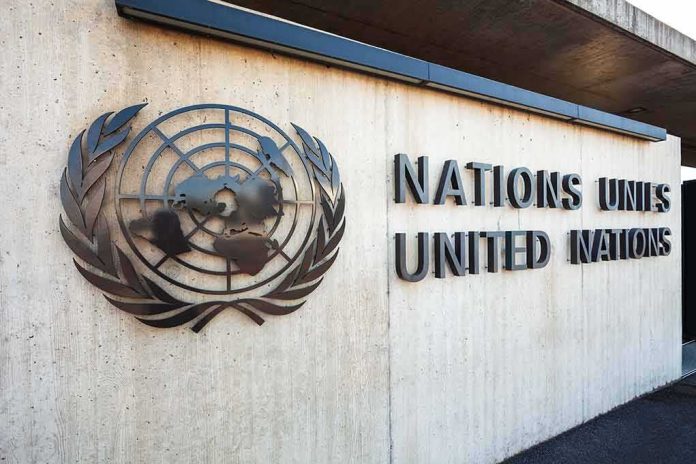
President Trump’s UN speech sent shockwaves through globalist ranks as he declared an end to unchecked migration and called out the UN’s failures—leaving patriots cheering and critics scrambling.
Story Snapshot
- Trump’s UN address directly condemned globalism and promoted American sovereignty.
- He claimed historic victories over illegal immigration and multiple wars.
- UN officials and left-leaning leaders responded with outrage, intensifying debates over US funding and border policy.
- His speech signals a new era of aggressive nationalist policy, challenging the UN’s authority and leftist agendas.
Trump’s Defiant Stand Against Globalism at the United Nations
On September 23, 2025, President Donald J. Trump took the podium at the 80th United Nations General Assembly in New York, delivering a forceful rebuke to globalist policies and the UN’s perceived ineffectiveness. Trump’s speech centered on American sovereignty and the right of individual nations to set their own course, sparking both applause from US conservatives and unease among international delegates. He declared that the time for multilateral compromise was over and that America would no longer be shackled by bureaucratic global institutions. By openly challenging the UN’s role in ongoing conflicts, migration crises, and climate debates, Trump positioned the United States as a lone defender of liberty and constitutional values.
Trump’s remarks triggered immediate reactions from UN officials and member states, with many left-leaning global leaders expressing public condemnation. The president’s address was punctuated by bold claims, including that his administration had ended seven wars and achieved zero illegal immigration—statements that electrified conservative audiences while drawing skepticism from foreign policy analysts. Trump specifically called out the United Nations for its failures in resolving global conflicts and for promoting policies he argued undermine national borders and security. The speech marked a dramatic escalation in US-UN tensions, with the administration signaling a readiness to reduce funding and participation if the organization continues to push agendas contrary to American interests.
Border Security and Migration: Delivering on Promises, Defying Critics
Central to President Trump’s address was his administration’s record on border control and immigration enforcement. He referenced sweeping executive orders issued since his inauguration, including a national emergency declaration at the southern border and the signing of the Laken Riley Act, mandating detention for immigrants charged with serious crimes. Trump’s policies have led to a sharp decrease in illegal border crossings, with the Department of Homeland Security reporting historic lows in 2025. Mass deportation operations directed by newly appointed “border czar” Tom Homan have targeted urban centers and eliminated previous restrictions on arrests in sensitive locations such as schools and churches. These actions, while controversial among left-leaning advocacy groups, have been widely praised by his conservative base who see them as vital for restoring law and order and protecting American families.
Despite the administration’s claims of ending illegal immigration and upholding the rule of law, critics argue that some measures—including warrantless home entries and expedited removals—raise constitutional and due process concerns. Attorney General Pam Bondi’s directive allowing law enforcement to enter migrant homes without warrants and the expansion of detention centers have sparked legal challenges and drawn opposition from civil rights organizations. However, the administration maintains that such policies are necessary to address years of lax enforcement and open borders. For many Americans frustrated by previous administrations’ handling of immigration, Trump’s hardline stance represents a long-overdue correction and a reaffirmation of national sovereignty.
Impact on International Cooperation and Domestic Policy
Trump’s confrontation with the United Nations has far-reaching implications for both international cooperation and domestic policy. In the short term, the speech has heightened diplomatic tensions and polarized debates on migration, climate change, and humanitarian aid. Some UN agencies and international NGOs now face uncertainty over US funding and operational support, while nationalist leaders worldwide are emboldened by America’s assertive posture. Domestically, Trump’s policies have delivered political gains among conservative voters who prioritize border security and constitutional rights. The administration’s rejection of “green energy” mandates and globalist initiatives aligns with longstanding conservative frustrations over government overreach and fiscal mismanagement. While the path forward remains contentious, Trump’s message is clear: America will chart its own destiny, defend its borders, and refuse to submit to foreign influence.
The Morning Briefing: Trump Triggers the UN and It's Pretty Freakin' Glorious https://t.co/Z3c41kqmGE
— John Richardson (@jpr9954) September 24, 2025
Longer-term, the possibility of reduced US participation in the UN could reshape global governance norms and shift the balance of power among international stakeholders. While critics warn of risks to conflict resolution and humanitarian efforts, supporters contend that prioritizing national interests is essential for safeguarding liberty and prosperity. The coming months will see ongoing debates over the effectiveness and legitimacy of the UN, with Trump’s administration determined to keep America first in every arena. For millions of Americans who have grown weary of leftist agendas and globalist entanglements, the president’s UN speech stands as a rallying cry for a renewed commitment to sovereignty, security, and the enduring principles of the US Constitution.
Sources:
At UN, President Trump Champions Sovereignty, Rejects Globalism
UN Web TV: President Trump Delivers Address to the General Assembly
President Trump Delivers Remarks to the UN General Assembly (White House video)







